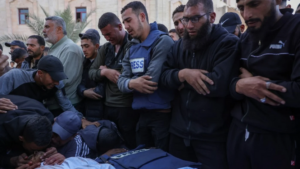Israel’s war on Gaza ‘worst ever conflict’ for journalists: Report

Relatives and colleagues mourn at the funeral of Palestinian journalist Hossam Shabat an Al Jazeera correspondent, and Mohammad Mansour, a Palestine Today correspondent, in Beit Lahia, northern Gaza, on 24 March 2025
Middle East Eye reports on 2 April 2025:
Israel’s war on Gaza has been the “worst ever conflict” for journalists, with at least 208 Palestinian media workers killed since October 2023, according to a report by the Watson Institute for International and Public Affairs.
The report, titled News Graveyards: How Dangers to War Reporters Endanger the World, said the Israeli assault on the Gaza Strip since October 2023 had “killed more journalists than the US Civil War, World Wars I and II, the Korean War, the Vietnam War (including the conflicts in Cambodia and Laos), the wars in Yugoslavia in the 1990s and 2000s, and the post-9/11 war in Afghanistan, combined”.
“In 2023, a journalist or media worker was, on average, killed or murdered every four days. In 2024, it was once every three days,” said the report. “Most reporters harmed or killed, as is the case in Gaza, are local journalists.”
Just last week, Mohammad Mansour, a correspondent for Palestine Today, and Hossam Shabat, a journalist for Al Jazeera Mubasher, were killed by Israel in two separate attacks. Their deaths brought the total number of Palestinian press workers killed by the Israeli army since October 2023 to 208.
The Government Media Office in the Gaza Strip said it condemned “in the strongest terms the targeting, killing and assassination of Palestinian journalists by the Israeli occupation”.
Shabat is the latest Al Jazeera journalist to be killed in Israel’s war, joining Samer Abu Daqqa, Hamza al-Dahdouh, Ismail al-Ghoul, and Ahmed al-Louh. “Al Jazeera affirms its commitment to pursue all legal measures to prosecute the perpetrators of these crimes against journalists,” the network said on Monday. It said that it renewed its commitment to covering events in Gaza “despite the ongoing targeting and harassment” faced by its journalists. Israel’s military admitted to killing Shabat, accusing him of being “a terrorist” who it had now “eliminated”.
The Watson Institute report also cited the conflict in Syria, which saw hundreds of journalists and media workers killed at the hands of the government and armed groups. According to the Syrian Network for Human Rights, 700 journalists and media activists were killed in Syria over 10 years.
The Watson Institute report warned that the threat against journalists in war zones across the world was not only putting individuals at risk but also impairing news coverage and the “worldwide information ecosystem”.
“The decreasing number of experienced foreign correspondents in conflict zones, due to long term shifts in the global news industry that have led to the de-prioritization of international news coverage and the closure of foreign news bureaus, has likewise crippled critical knowledge and helped facilitate the creation of news graveyards,” said the report.
This article is reproduced in its entirety
